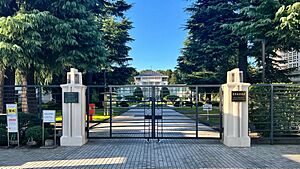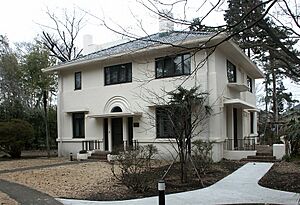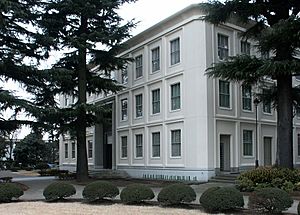Tokyo Woman's Christian University facts for kids
|
東京女子大学
Tōkyō Joshi Daigaku |
|

The front gate of Tokyo Woman's Christian University
|
|
| Motto |
Quaecunque Sunt Vera
|
|---|---|
|
Motto in English
|
Whatsoever Things Are True |
| Type | Private |
| Established | 1918 |
| President | Shoko Ono |
| Location |
,
35°42′40″N 139°35′25″E / 35.71111°N 139.59028°E |
| Website | https://www.twcu.ac.jp/main/english/index.html |
Tokyo Woman's Christian University, often called TWCU or Tonjo, is a private university in Tokyo, Japan. It is a Christian university that welcomes students from all backgrounds.
Contents
Founding the University
TWCU was started by Nitobe Inazō (1862–1933). He was a famous author, diplomat, and educator. Nitobe Inazō became the first president of the university in 1918. The first classes were held in Tsunohazu.
When Nitobe was a student in the United States, he joined the Religious Society of Friends, also known as Quakers. This group's ideas made him believe that Japanese women should have good chances to get an education. He worked with August Karl Reischauer and Tetsu Yasui to create Tokyo Woman's Christian University.
Exploring the Campus
The TWCU campus is in Iogi-mura, Toyotama-gun. The university moved there in 1924. The buildings were designed in the 1920s by Antonin Raymond. He also helped build the famous Imperial Hotel, Tokyo in Tokyo.
The university has seven buildings that are special cultural properties in Japan. This means they are important for their history and design. The campus also has beautiful gardens, open areas, and a small forest. In the forest, you can find plum trees, cherry trees, and tall pine trees. Sometimes, even raccoon dogs are seen there! Even though it's in a city, the campus is very green and spacious.
Special Places on Campus
The Nitobe Memorial Room is inside the main building. It has old papers and photos that show the university's history and ideas.
The chapel has colorful stained glass windows and a large pipe organ. Students can attend a worship service there every morning. The auditorium is used for important events. These include the welcome ceremony for new students, the university festival, and graduation.
The Reischauer House is another important building. Dr. August Karl Reischauer and his family used to live there. It is built in a Western style and has a charming, old-fashioned feel.
Building No. 23 is the newest building, finished in 2009. It is the tallest building on campus. It has a wooden deck and terraces. On a clear day, you can see Mount Fuji and Tokyo Tower from the top floor!
What Students Study
TWCU has one main faculty with twelve departments. Students can choose their main subject, called a major, from these departments. The biggest department used to be Literature and Culture in English. The smallest is Philosophy. In 2018, the departments were reorganized to offer new and updated courses.
Departments at TWCU
- Department of International English
- This department combines former studies in English literature, culture, and language science.
- Department of Humanities
- Department of Philosophy
- Department of Japanese Literature
- Department of History and Culture (used to be just History)
- Department of International Society
- Department of International Relations
- Department of Economics
- Department of Sociology
- Department of Community Planning (a new department)
- Department of Psychology and Communication
- Department of Psychology
- Department of Communication
- Department of Mathematical Science
- Department of Mathematics
- Department of Information Sciences
TWCU offers a strong liberal arts education. This means students learn about many different subjects, not just their major. This helps them get a well-rounded education. After finishing their studies, students earn a bachelor's degree. The university also offers master's and doctoral degrees for students who want to study even more.
Famous Graduates
TWCU is known as one of the best women's universities in Japan. Many famous women have studied or graduated from TWCU, including:
- Marie Kondo (consultant, author)
- Sawako Ariyoshi (writer)
- Hanae Mori (fashion designer)
- Jakucho Setouchi (writer)
- Mikako Tabe (actress)
- Ichiko Ima (manga artist)
Connecting with the World
The university has partnerships with other great universities around the world. This allows students to have international experiences.
- Australia: University of Wollongong, Australian Catholic University, Flinders University
- China: Shanghai International Studies University
- Korea: Ewha Womans University, Sungshin University
- USA: St. Michael's College, Scripps College, California State University, Presbyterian College, Otterbein University
- Canada: McGill University, Algoma University, University of the Fraser Valley
- UK: Lancaster University, Middlesex University, The University of Edinburgh, The University of Leeds, The University of York
- Ireland: Dublin City University
- Spain: Alcalingua, Universidad de Alcalá
- France: Université Catholique de L'Ouest
Learning English
Tokyo Woman's Christian University is known for its excellent English language education. It has a "Career English Program." In this program, students take classes completely in English. They learn to think critically, debate, write, speak, and give presentations at a high level.
The university also offers weekly English conversation classes at the Career English Island (CEI). Students can practice speaking English with instructors and students from other universities. Anyone at the university can join these classes.
TWCU often hosts the International Theater Company London. This group comes from London to perform plays by Shakespeare in English. These plays are directed by Paul Stebbings. Past performances have included A Midsummer Night's Dream, Romeo and Juliet, and Twelfth Night.
The Campus Festival
Every November, the university holds its annual festival called the "VERA Festival." The name "VERA" comes from the Latin phrase "QUAECUNQUE SUNT VERA." This phrase is carved into the main building of Tokyo Woman's Christian University. It comes from a famous letter by Paul of Tarsus in the Bible (Philippians 4:8). It means:
Whatever is true, whatever is honorable, whatever is just, whatever is pure, whatever is lovely, whatever is commendable, if there is any excellence, if there is anything worthy of praise, think about these things.
The VERA festival has many performances by university clubs. Many people visit the campus to enjoy the festival.
University Symbol
The university symbol was created in 1918 by the first president, Dr. Inazo Nitobe. The symbol has two linked "S's." These letters stand for "service and sacrifice." Dr. Nitobe chose these words to show the Christian spirit of the university. He taught that helping others, through "service and sacrifice," is the best way to show Christian values. You can see this symbol on many items, like stationery, sold at the TWCU bookstore.
University Song
Throughout its history, TWCU has had two university songs. The first song was written by Kosaku Yamada. The second song was composed in 1950 by the English poet Edmund Blunden. The fourth president, Isao Saito, asked Blunden to create a new song. Blunden was a professor at TWCU and the University of Tokyo at the time. This song is based on an old English hymn. It is sung in Japanese at the graduation ceremony every year.
 | Georgia Louise Harris Brown |
 | Julian Abele |
 | Norma Merrick Sklarek |
 | William Sidney Pittman |



